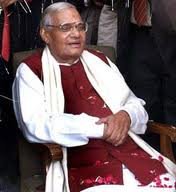Career as the Prime Minister
Atal Bihari Vajpayee

Career as the Prime Minister
The BJP emerged the single largest party in Lok Sabha in the 1996 general elections. Vajpayee was sworn in as the Prime Minister in May 1996. However, he resigned after 13 days since BJP could not obtain a majority.He was again sworn in as the Prime Minister in 1998 after BJP emerged as the single largest party and formed the National Democratic Alliance (NDA) with other political parties. This government lasted for a little over a year when fresh elections were held.
It was during his tenure that India conducted underground nuclear tests in Pokhran in May 1998, just a month after the government came into power. These tests were regarded a national milestone.The Kargil War between India and Pakistan took place between May and July 1999. By the end of the war, the Indian Army and Air force had recaptured the areas infiltrated by the Pakistani militants. The Kargil victory cemented the reputation of Vajpayee as a strong and able leader of the nation.The BJP led NDA again emerged as the largest political alliance in the 1999 general elections in the wake of the Kargil War victory. Vajpayee was made the Prime Minister for the third time in October 1999.
He introduced many economic and infrastructural reforms like strengthening of private sectors, encouraging private research and development, bringing about privatization of certain government owned corporations, etc. His major projects were National Highway Development Project and Pradhan Mantri Gram Sadak Yojana.U.S. President Bill Clinton paid a state visit to India in March 2000. Clintons visit to India was viewed as very significant in improving the foreign trade and economic relations between the two nations.
Vajpayees privatization campaigns were criticized by trade unions and government employees as excessive privatization was not in their favour.In 2001, he invited the Pakistani President Pervez Musharraf to India with a view to improve Indo Pak relations. However, this attempt could not achieve much success for India.He launched the Sarva Shiksha Abhiyan in 2001, with the aim of universalization of elementary education.
The Parliament House in New Delhi was attacked in December 2001 by Pakistan trained terrorists. Investigations pointed to a conspiracy hatched in Pakistan. For a long time the threat of a full fledged war between the two nations loomed. The Prevention of Terrorism Act, 2002 (POTA) was enacted in the aftermath of the attack. The Vajpayee government implemented several economic reforms during 2002 03 which resulted in a record growth rate of 6 7% in the GDP. The international image of India also improving due to the rapid developments that took place in the country during this perios.Vajpayee resigned as Prime Minister in 2004 after Congress emerged as the single largest party in the general elections.He announced his retirement from active politics in 2005 and didnt contest the 2009 parliamentary elections.
 Later career
Later career 2002 Gujarat violence
2002 Gujarat violence Professional Life of Atal Bihari Vajpayee
Professional Life of Atal Bihari Vajpayee
 Major Works
Major Works Travel and diplomatic assignments
Travel and diplomatic assignments Personal Life Legacy
Personal Life Legacy 2001 attack on Parliament
2001 attack on Parliament Personal life and interests
Personal life and interests Career as the Prime Minister
Career as the Prime Minister Childhood Early Life
Childhood Early Life personal background
personal background Kargil War
Kargil War Test your English Language
Test your English Language  Wacky Ideas to attract your Partner
Wacky Ideas to attract your Partner SuperFood
SuperFood What to Eat in Arunachal Pradesh
What to Eat in Arunachal Pradesh Makeover Tips for Cheeks
Makeover Tips for Cheeks Nelson Mandela
Nelson Mandela Tips to get ready for Job Interview
Tips to get ready for Job Interview Benefits of Peaches
Benefits of Peaches The Most Romantic Train Journeys
The Most Romantic Train Journeys




